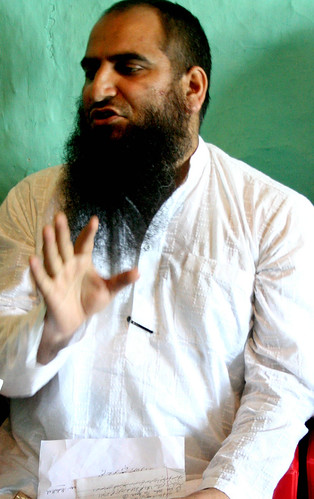By Sheikh Qayoom,
Srinagar : Jammu and Kashmir Chief Minister Mufti Muhammad Sayeed’s decision to “provide democratic space to separatist politics” by releasing Masrat Alam has badly backfired. Instead, the decision had made hardline positions on two sides even harder.
Alam’s arrest in 2010 was “a hard earned success” for the security forces as the intelligence agencies believed he had been spearheading the bloody agitation in which 110 youths were killed in clashes with the security forces.

Masrat Alam (TCN file photo)
The authorities had earlier announced a reward of Rs.1 million for anyone divulging information that would result in Alam’s arrest.
Incidentally, the summer unrest of 2010 died down after Alam’s arrest.
Barely six days after he took over power in the state on March 1, Sayeed ordered Alam’s release from a jail in north Kashmir’s Baramulla town.
To back up the decision, the state home department said Alam’s detention period under the Public Safety Act (PSA) had expired and since there were “no further grounds to keep him under detention, the release had become unavoidable”.
Sayeed’s colleagues in the PDP said the decision should have been taken by the previous government since the hardline separatist leader was being detained without any legal grounds.
On a larger note, Sayeed said separatists needed to be provided larger democratic space to woo them away from violence and to accommodate their viewpoint in the country’s democratic framework.
The euphemistic statement by Sayeed, who is known for his “healing touch” policy, attracted flak from his ruling allies in the BJP, the opponents in the Congress and the regional National Conference.
Despite the initial outbursts against the decision, things seemed to have se ttled down till Masrat Alam led a reception rally for senior separatist leader, Syed Ali Geelani who returned home on Tuesday after spending more than three months in New Delhi because of health reasons.
Youths surrounding Alam displayed Pakistan flags at the rally, shouted Pro-Pakistan slogans and even mounted the outer wall of the police headquarters in the area to display Pakistan flag for the media cameras.
Alam did not raise any slogans himself, nor did he display the Pakistan flag and yet few doubt the fact that he was the galvanising force for the youth who surrounded him.
Geelani and Alam were put under house arrest to scuttle Friday’s proposed separatist rally to south Kashmir Tral town. Alam was shifted on Friday from his residence to Shaheedgunj police station from where he was been shifted to Humhama police station in Badgam, where a case has been registered against him for the Tuesday rally. This led a section of the media to wrongly report that he had been arrested.
The problem for the state government in general and the chief minister in particular is that Alam’s release, however, well intentioned it might have seemed, has badly backfired.
Instead of creating any democratic space between the mainstream and hardline viewpoints in the country, it has provided material for hardliners on both sides.
Sayeed, while reacting to the display of the Pakistan flag and the anti-national sloganeering, said: “This is unacceptable. All I can say is that the law will take its own course.”
This is the closest a wily old politician like Sayeed can go to accepting the folly of his decision.
“The authorities needed sufficient grounds for Alam’s detention and re-arrest. The Geelani reception rally has provided them that. What are they now waiting for,” a senior Congress leader who did not want to be named had asked while speaking to IANS.
While the separatists might claim the sentiment for them is intact in Kashmir, which only needs a spark from time to time by campaign managers like Masrat Alam, the problem for Sayeed is that he finds himself on the right side of no one in this particular case.
Geelani has called Sayeed an RSS facilitator in Kashmir while the RSS has called him a “pro-Pakistan chief minister”.
So, has Sayeed’s doctrine of providing “democratic space to separatists” become outdated and self-defeating? In short, has Alam become a rock stuck in the chief minister’s throat?
Given the toughening of postures by both sides, Sayeed is finding himself as the Lone Ranger who tries to bridge the chasm between the separatist and the mainstream viewpoints but is damned by both.
(Sheikh Qayoom can be contacted at [email protected])
